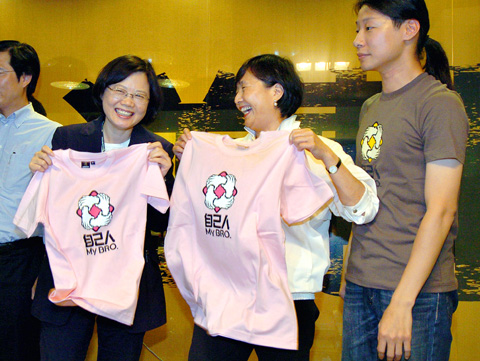The Democratic Progressive Party (DPP) will work to establish itself as a center-left party during its time in opposition, promoting wealth distribution, social justice and a comprehensive welfare system during the next four years, DPP Chairwoman Tsai Ing-wen (蔡英文) said yesterday.
Tsai — talking to members of the Taiwan Foreign Correspondents Club in Taipei — reiterated the message she has been delivering since taking over as party chair last month, saying the next four years were vitally important as the party needs to start again following its defeat in January’s legislative and March’s presidential elections.
Party unity was the most important aspect of the rebuilding, Tsai said, adding that a recent opinion poll had shown public perception of the DPP’s unity had increased dramatically.

PHOTO: LIAO CHEN-HUEI, TAIPEI TIMES
Asked about how the party would reconnect with grassroots voters and compete with the Chinese Nationalist Party’s (KMT) traditionally strong local organization networks, Tsai said the DPP would strive to increase direct contact with voters and would use former government officials to extend its grassroots movements.
Tsai said that although the party was strapped for cash, one thing it did have was a lot of time and it would use that time to re-energize its disappointed supporters.
On the issue of sovereignty, Tsai said that while it was important, it would not be the main focus for the party under her tenure. She said the DPP would remain firm but practical on the issue and accused the KMT government of giving away “too much, too fast” in the recent cross-strait talks with China, adding that a balance needed to be obtained.
Quizzed on whether she would lead opposition supporters to the streets if the new government failed to live up to expectations, she said that it was not her “style.”
She said that while the DPP wouldn’t tell people to protest, it would help organize things if that were the case.
Talking about the lack of stability and continuity in the DPP and the high turnover of party leaders in the past, Tsai said it was important for the DPP to experience a period of stability and emphasized she would not resign if the party performed poorly in next year’s local county commissioner and mayoral elections.

Several Chinese Nationalist Party (KMT) officials including Chairman Eric Chu (朱立倫) are to be summoned for questioning and then transferred to prosecutors for holding an illegal assembly in Taipei last night, the Taipei Police said today. Chu and two others hosted an illegal assembly and are to be requested to explain their actions, the Taipei City Police Department's Zhongzheng (中正) First Precinct said, referring to a protest held after Huang Lu Chin-ju (黃呂錦茹), KMT Taipei's chapter director, and several other KMT staffers were questioned for alleged signature forgery in recall petitions against Democratic Progressive Party (DPP) legislators. Taipei prosecutors had filed

Taiwan would welcome the return of Honduras as a diplomatic ally if its next president decides to make such a move, Minister of Foreign Affairs Lin Chia-lung (林佳龍) said yesterday. “Of course, we would welcome Honduras if they want to restore diplomatic ties with Taiwan after their elections,” Lin said at a meeting of the legislature’s Foreign Affairs and National Defense Committee, when asked to comment on statements made by two of the three Honduran presidential candidates during the presidential campaign in the Central American country. Taiwan is paying close attention to the region as a whole in the wake of a

NEW WORLD: Taiwan is pursuing innovative approaches to international relations through economics, trade and values-based diplomacy, the foreign minister said Taiwan would implement a “three-chain strategy” that promotes democratic values in response to US tariffs, Minister of Foreign Affairs Lin Chia-lung (林佳龍) said. Taiwan would aim to create a “global democratic value chain,” seek to capitalize on its position within the first island chain and promote a “non-red supply chain,” Lin was quoted as saying in the ministry’s written report to the Legislative Yuan submitted ahead of the legislature’s Foreign Affairs and National Defense Committee meeting slated for today. The Ministry would also uphold a spirit of mutual beneficial collaboration, maintaining close communication and consultations with Washington to show that Taiwan-US cooperation

Taiwan and the US have begun trade negotiations over tariffs imposed by US President Donald Trump earlier this month, Minister of Foreign Affairs Lin Chia-lung (林佳龍) said in an interview this morning before reporting to the Legislative Yuan’s Foreign Affairs and National Defense Committee. The Taipei Economic and Cultural Representative Office (TECRO), Taiwan’s de facto embassy in the US, has already established communication channels with the US Department of State and the US Trade Representative (USTR), and is engaging in intensive consultations, he said. Points of negotiation include tariffs, non-tariff trade barriers and issues related to investment, procurement and export controls, he